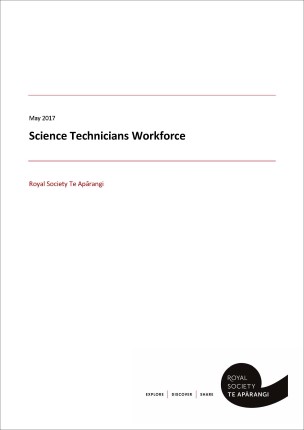Science technicians workforce

2017: Report finds a deficiency in the practical skills of those entering the science technicians workforce in New Zealand and suggests a national approach to overcome these deficiencies.
UPDATE: An update on the science technicians workforce published in August 2019 outlines developments in the different education and research sectors since the report was released.
Royal Society Te Apārangi set up a Science Technicians Workforce Panel, chaired by Professor Jim Johnston FRSNZ, to provide advice on the science technician workforce in New Zealand.
It found too many graduates applying for science technician roles require significant on the job training as they lack technical aptitude and transferable practical skills.
The report examines concerns raised from within the science sector about the technician workforce. It recommends a new approach to education for these roles.
Its terms of reference were to identify a national approach to science technicians’ careers and training in New Zealand. Specific questions addressed include:
- What are the future needs of the New Zealand economy for science technicians?
- What is the likely future range of science technician roles?
- What are the issues around career structure for science technicians?
- Developmental training processes
- Providing meaningful and rewarding career pathways
- What key skill areas and competencies are needed?
- What would a national qualification structure look like and how could it be delivered?
- How would the proposed qualification system interface with other related qualification systems, such as those for ICT and engineering technicians, and specialised technicians within the medical workforce?
The panel consulted widely to ensure its advice has wide support in relevant stakeholder communities.
A major concern to the panel was that too few students are selecting the diploma route through polytechnics, even though this route was demonstrably fit for purpose, and led to excellent career outcomes. Hence there is also a need for improved careers advice.
The panel suggests a two-fold approach for the future involving both the Level 6 Diploma in Applied Science delivered in polytechnics, and core requirements in laboratory practice for certain science degrees.
Detail on the two-fold approach:
- The polytechnic sector should establish a national network of provision for educating and training science technicians focusing on the Level 6 Diploma in Applied Science qualification, this pathway being most suitable for technicians who will enter employment in industry and service roles.
- Additionally, the degree-based pathway encompassing the Bachelor of Science qualification should be improved as a route to technician employment, especially for those seeking careers in research organisations. A suitable approach would include a core requirement for the basics of laboratory practice, and/or the introduction of a minor in laboratory practice within the degree programme.
The panel concluded that careers advice given to young people should realistically set out the routes and career opportunities in the technician workforce, similar to the Engineering Education-to-Employment (E2E) programme operated by the Tertiary Education Commission.
The panel further suggests that interested employers provide practical work experience for students during their undergraduate training, lessening the on-the-job training they otherwise have to provide to overcome the deficit of transferable practical skills of new employees.
Many other countries, including the United Kingdom and most recently the United States have also been studying the future viability of their technical workforces.

Download report: Science Technicians Workforce
Science Technician Workforce Panel
- Professor Jim Johnston FRSNZ (Professor of Chemistry, Victoria University of Wellington)
- Dr Ian Brown FRSNZ (Manager, Advanced Materials Group, Callahan Innovation)
- John Futter (Senior R&D Electronics Engineer, GNS Science)
- Dr Val Orchard (Former General Manager Science and Research, ESR)
- Professor Linton Winder (Head of Department, Department of Forestry and Resource Management, Waiariki Institute of Technology)
Science Technician Workforce Panel Expert Reference Group
An expert reference group was established to provide advice and review:
- Graham Burnip (Senior Advisor, Government Industry Agreements, Ministry for Primary Industries)
- David Cook (Science Technician, Garin College, Nelson)
- Troy Coyle/Andrew Mackay (Bluescope Steel (NZ Steel))
- Mike Ede (Environmental Monitoring Team, Marlborough District Council)
- Alan Hoverd (Technical Team Leader, School of Biological Sciences, Victoria University of Wellington)
- Professor Stephen MacDonell (Professor of Software Engineering, Director of the Software Engineering Research Laboratory (SERL), AUT University)
- John McEwan (Senior Scientist, Animal Genomics, AgResearch Invermay)
- John Mitchell (Marine Geologist, NIWA)
- Professor Owen Young (Professor of Food Technology, AUT University)
- Julie Knighton (General Manager R&D Operations, Fonterra)
- Ann May Nuku (Plant Manager, AFFCO Manawatu)
